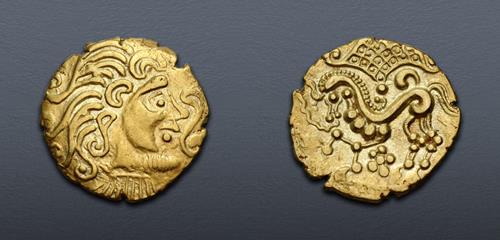|
GAUL, Northeast. Parisii. 2nd century BC. AV Stater (22mm, 7.41 g, 4h). Class IV (“au nez retroussé”). Celticized head of Apollo right; ornament before / Celticized horse galloping left; the charioteer devolved into a fan shape with checkerboard design, rosette below. CdB fig. 14, 3 (same dies); D&T 81; Depeyrot, NC V, 187; de la Tour 7792; Triton XVI, lot 625 (same dies in later state). Small scuff on obverse, edge splits. EF. Well struck. Very rare. Same dies as Triton XVI example cited above, though in an earlier state, this coin is exceptional for the quality of strike and considerable original luster in devices.
Much of the Celtic gold coinage consisted of stylized derivatives of the ubiquitous gold staters of Philip II type. Originally copied faithfully by Celtic tribes along the Danube, these types of Apollo and chariot slowly spread westward among the coinage of the central and western European tribes, who continually modified their appearance and often added subsidiary symbols that apparently held local significance. The Parisii made their staters into works of art, their coins being among the finest of all Gallic issues. The extraordinarily rich artistic treatment of the horse is characterized by a curvilinear triangular formation above it, the so-called ‘wing’, containing square compartments, each enclosing a pellet, perhaps representing the canopy of heaven. According to Caesar's De Bello Gallico (VI 3), the capital of the Parisii was the village of Lutetia on a marshy island in the Seine. The Parisii sided with Vercingetorix against the Romans, and the Celtic chieftain sent a force under his lieutenant, Camulogenus, to secure the area. Camulogenus and his men were soon defeated near Melun, and the region came under Roman control. Lutetia was thoroughly Romanized, and although it flourished, the town was of minor importance compared to Agedincum, the capital of its province, Lugdunensis Senona. The town was renamed Paris, after the Celtic tribe, in the third or fourth century, but remained relatively small until the Merovingian Clovis made the city his capital in the early sixth century.
The final winners of all CNG Feature Auction 126 lots will be determined during the live online sale that will be held on 28-29 May 2024. This lot is in Session One, which will begin 28 May at 9 AM ET.
Winning bids are subject to a 22.5% buyer's fee for bids placed on this website and 25% for all others.
We recognize that our users may have various Internet Browsers and Operating Systems. We like our visitors to have the best possible experience when using our bidding platform. However, we do recognize that it is impossible to develop applications that work identically, efficiently and effectively on all web browsers. The CNG bidding platform supports the latest stable major version and stable previous version of Chrome and Firefox.
|
